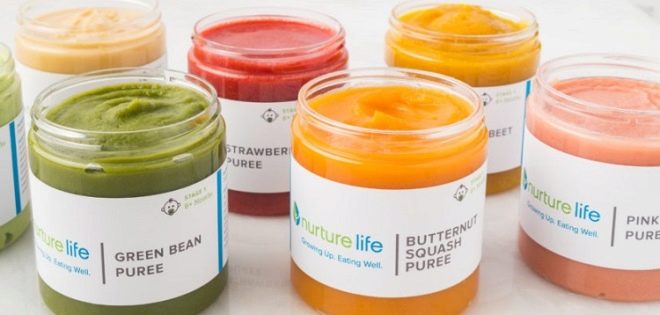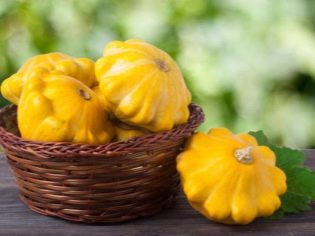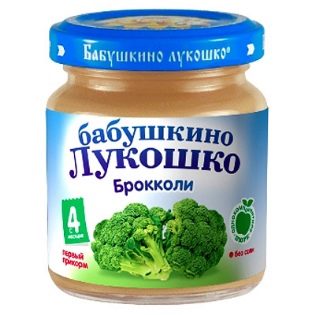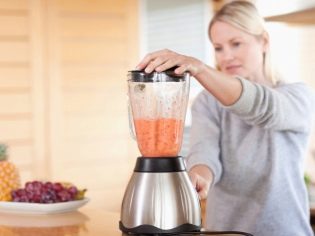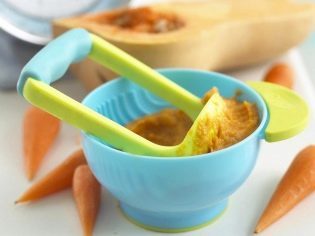Recipes and rules for the use of baby vegetable puree
Vegetable mashed potatoes for babies as a complementary food is recommended first. Not juices and porridges, as some parents think, namely vegetables. They are rich in vitamins and minerals, they have enough dietary fiber, which will provide the child with a soft and delicate digestion and will be a good prevention of constipation.
In this article we will talk about how to introduce vegetable food, how to prepare tasty and healthy mashed potatoes for babies, what vegetables to give and in what quantity.
What vegetables does the first lure start with?
Breast milk and adapted milk formulas satisfy the requirements of the child for about the first half of the year. Then the baby's diet should be expanded. Vegetable puree pediatricians recommend to enter into the diet in the first place. But not all vegetables are allowed to start dating babies with new food.
It is recommended to begin to enter vegetables with mashed potatoes. However, it should be made from hypoallergenic vegetables.
If the baby is breastfed, it is recommended to introduce vegetable food from 5-6 months. For a child who, by coincidence, is deprived of breast milk and eats mixtures, it is better to introduce vegetables into the diet at 4 months of age.
It is recommended to introduce vegetables in a specific sequence. For the very first acquaintance with a new meal recommended vegetables that do not usually cause allergies, the so-called low-allergenic. These are zucchini, broccoli and cauliflower. In this case, the first baby vegetable puree must necessarily be one-component, that is, it should contain only one type of vegetable culture - only squash or only cauliflower puree.
Next, the vegetable ration is expanded by the products of medium allergenicity. Approximately one month after the introduction of complementary foods, you can give vegetables from this list in order:
- pumpkin;
- carrot;
- potatoes;
- squash.
A month later, at the age of 7-8 months, add cabbage, beets and cucumbers, a year - tomatoes, and in 1.5 years - beans, peas and others legumes. Eggplant is recommended to enter after one and a half years, closer to 2 years.
Manufacturers Rating
Ready baby mashed potatoes in a jar - it is convenient and safe. Manufacturers make sure that the composition of the product is hypoallergenic, balanced. For the beginning of the lure mashed potatoes in a jar - the best optionAfter all, it is inexpedient to cook homemade mashed potatoes for the sake of half a teaspoon, which the baby will eat. In addition, the puree in the bank is convenient to take with you for a walk, on a trip.
The choice of a particular brand of baby food is a matter of family income and preferences. A pediatrician can only recommend certain manufacturers, but parents will still choose for themselves, taking into account the preferences of their own baby, because it happens that the child mashed potatoes of the same brand refuses to eat, and he is delighted with the same mashed potatoes, but of another manufacturer.
The rating of producers of baby vegetable puree is based on several criteria:
- safety and risk of product allergy;
- taste qualities;
- feedback from parents and pediatricians.
According to these three criteria, you can arrange the existing brands in the following order:
- Humana;
- Gerber;
- "Grandmother's basket";
- Nutricia;
- "FrutoNyanya";
- "Theme";
- "Spelenok";
- "Agusha";
- Hipp.
When choosing the finished mashed potatoes, be sure to pay attention to the age marking, for the shelf life. If when opening a jar does not emit cotton, you can not feed the child such mashed potatoes. If desired, you can make vegetable puree yourself, but you should meet a number of important conditions.
Selection and preparation of ingredients
For the preparation of homemade vegetable puree, which can be given to an infant, you need to choose only fresh vegetables, the appearance of which is not satisfactory. If zucchini or pumpkin have darkening, irregularities, areas of rot, cracks, "spoiled" sides, they are not suitable for baby food.
Vegetables can be bought on the market, in the store, but the best option is the fruits and roots gathered on your site. If there is no cottage or garden, choose only those purchased from your lane. Imported and imported vegetables and fruits are usually stuffed with lots of chemicals to preserve their presentation. You should be especially careful when choosing vegetables, if there is no season in your strip. Instead of the purchased zucchini in the midst of winter, it is better to buy ready-made mashed potatoes in a jar from a trusted baby food manufacturer.
It is not necessary to select vegetables for baby puree, the sides of which are shiny - it is possible that wax can be used to preserve moisture when transporting it from afar.
Home Cooking Recipes
It is easy to make mashed potatoes. The task will facilitate the presence in the kitchen blender, steamers. A good mash is obtained in a slow cooker. In order to make a one-component mash for the first feeding, take a zucchini, wash it well and peel it. Cut the vegetable into large pieces, after removing the seeds and the core.
If you cook the vegetables in small pieces, in them during the heat treatment almost no beneficial substances will remain.
Put the slices of the zucchini into a bowl of a slow cooker, steamer or a small saucepan with a little water. Bring under cover to readiness. Blender turn boiled zucchini into a puree. If it turns thickish, add a little vegetable broth, which remained after heat treatment, or boiled water. It is not recommended for babies to pickle and pepper vegetable puree.but you can add a couple of drops of cold-pressed olive oil. Ready mash is not stored. Before the next feeding, which provides supplementation with vegetables, it is prepared anew.
After 8 months, the baby will be able to eat multicomponent mashed potatoes.. In this case, you can immediately cook in a similar way several types of vegetables, and then make one of them puree. Zucchini and carrots, zucchini and broccoli, cauliflower and carrots, beets and carrots are well combined. Almost all types of vegetables are perfectly combined with mashed potatoes., which is prepared similarly, but with the addition of milk or water (as authorized by the pediatrician), without butter. As your baby grows, you can create pureed soups, as well as vegetable mousses, for example, from boiled pumpkin and cottage cheese, from zucchini and boiled carrots, based on the usual vegetable purees.
Rules and regulations of use
Lure start always with a minimum amount of new product. For a baby, dating vegetables should start with half a teaspoon. During the day, the mother should carefully observe the baby. If you do not show allergies, intestinal disorders, the next day you can increase the amount of vegetable puree to a teaspoon.
The formula for infant feeding does not imply the addition of more than one new product in two days. It is important to keep track of the possible negative reactions of the child's body to food.For the baby and his parents will be useful if the amount of complementary foods will meet the standards.
A table indicating the minimum and maximum values of the amount of vegetable puree, permissible at a given age, will help determine them.
Age month | 5 | 6 | 7 | 8 | 9 | 10 | 11-12 |
The number of vegetable puree per day, g | 10-30 | 10-50 | 80-150 | 170 | 180 | 180-200 | 200-250 |
The table shows the daily value. Parents can split this amount into two or three meals if the child loves vegetables. Thus, a child at 5 months can be given vegetables twice a day, 15 grams per feeding, and at 6 months, you can give twice 25 grams.
Before the year is important to teach a child to eat vegetables, otherwise later, at a later age, the baby may refuse to eat these useful and necessary products for their growth and development. But only in theory, children should eat one or another amount of food. In practice, things may turn out wrong - the child will demand more and more vegetables or refuse them altogether. With the latter problem, most often parents and turn to pediatricians.
What if the child does not want to eat mashed potatoes?
A child who does not want to eat vegetable puree at his tender age, there are plenty of reasons for this behavior.
Here are just some of the reasons why children refuse this dish.
- Lure is introduced too early., the child is not psychologically and physiologically ready for it - you need to postpone the venture and return to it in a week.
- The taste of vegetables does not like the child - Try to give another vegetable. If you do not eat zucchini, give broccoli, if you refuse to buy store mashed potatoes in a jar, cook it at home.
- The type of vegetables is incomprehensible or unpleasant - put the child more often in the chair at the adult table during dinner or breakfast, he should see how adults eat their food. This will form an idea of why the mother bothers him at all with a spoon and a strange substance in a plate or jar. Serve puree in a beautiful baby plate, use an interesting spoon with animal figures, interest your child in the process of eating.
- The child is not up to vegetables - his teeth are cut or his stomach hurts, he gets sick. In this situation, it is impossible to offer new products, so as not to increase the load on the body of the baby.
- Baby is not hungry - in this situation, wait until the child gets hungry and offer vegetable puree at the very beginning of the meal.
- Already have a negative experience - if the kid was forced to eat vegetables, they pushed a spoon into him with force, the taste of mashed potatoes would be unpleasant for understandable psychological reasons. In this situation, give the child the opportunity to choose independently whether to eat or not. And vegetables, which are so needed, can be mixed in other types of food, for example, in vegetable soup-puree, in porridge.
In order to prevent situations in which the child will hate vegetable dishes, it is important to do everything in a timely manner. Do not follow too blindly the advice of relatives and pediatricians about the timing of feeding. If a child once in his six months abandoned the zucchini, no need to insist. Try to offer him lure a little later.. All children develop at different speeds and according to their own schedule. This concerns not only height and weight, but also metabolic processes, the processes of production of the necessary enzymes in the body, because without them the assimilation of new food is impossible.
The same recommendation applies to the amount of vegetables eaten. The child owes nothing to anyone. He may well have his own tastes and needs in the number of complementary foods. And his real requirements for accuracy do not always correspond to pediatric norms and tables.
To learn how to make vegetable puree at home for a child of 7-8 months, see the following video.

